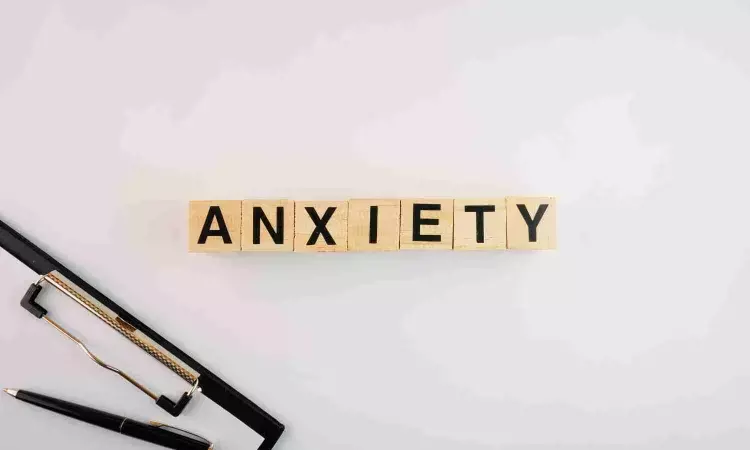- Home
- Medical news & Guidelines
- Anesthesiology
- Cardiology and CTVS
- Critical Care
- Dentistry
- Dermatology
- Diabetes and Endocrinology
- ENT
- Gastroenterology
- Medicine
- Nephrology
- Neurology
- Obstretics-Gynaecology
- Oncology
- Ophthalmology
- Orthopaedics
- Pediatrics-Neonatology
- Psychiatry
- Pulmonology
- Radiology
- Surgery
- Urology
- Laboratory Medicine
- Diet
- Nursing
- Paramedical
- Physiotherapy
- Health news
- Fact Check
- Bone Health Fact Check
- Brain Health Fact Check
- Cancer Related Fact Check
- Child Care Fact Check
- Dental and oral health fact check
- Diabetes and metabolic health fact check
- Diet and Nutrition Fact Check
- Eye and ENT Care Fact Check
- Fitness fact check
- Gut health fact check
- Heart health fact check
- Kidney health fact check
- Medical education fact check
- Men's health fact check
- Respiratory fact check
- Skin and hair care fact check
- Vaccine and Immunization fact check
- Women's health fact check
- AYUSH
- State News
- Andaman and Nicobar Islands
- Andhra Pradesh
- Arunachal Pradesh
- Assam
- Bihar
- Chandigarh
- Chattisgarh
- Dadra and Nagar Haveli
- Daman and Diu
- Delhi
- Goa
- Gujarat
- Haryana
- Himachal Pradesh
- Jammu & Kashmir
- Jharkhand
- Karnataka
- Kerala
- Ladakh
- Lakshadweep
- Madhya Pradesh
- Maharashtra
- Manipur
- Meghalaya
- Mizoram
- Nagaland
- Odisha
- Puducherry
- Punjab
- Rajasthan
- Sikkim
- Tamil Nadu
- Telangana
- Tripura
- Uttar Pradesh
- Uttrakhand
- West Bengal
- Medical Education
- Industry
BMC Study Reveals Strong two way relationship Between Anxiety and Cancer Risk

A recent study published in the journal of BMC Cancer found a significant two-way relationship between anxiety disorders and cancer and revealed that individuals with anxiety are more likely to develop certain types of cancer, and vice versa.
After analyzing data from Taiwan’s National Health Insurance Research Database, this retrospective cohort study followed two large patient groups between 2003 and 2016. The first group included over 23,000 individuals diagnosed with anxiety disorders, while the second group included more than 33,000 individuals diagnosed with cancer between 2003 and 2005. Each of these groups was compared with matched control cohorts using a 1:4 case-control sampling method. This study then applied Cox proportional hazard regression models to estimate the risk of developing the opposite condition.
The individuals with anxiety disorders were 29% more likely to develop cancer when compared to those without anxiety (Adjusted Hazard Ratio [AHR] = 1.29; 95% Confidence Interval [CI]: 1.23–1.35). The risk was even higher for certain cancers. Thyroid cancer had the strongest link, with an AHR of 2.13 (CI: 1.60–2.82), followed closely by skin cancer (AHR: 2.10; CI: 1.63–2.71) and prostate cancer (AHR: 1.97; CI: 1.59–2.47).
But the reverse was also true, where the patients diagnosed with cancer were 63% more likely to develop an anxiety disorder than individuals without cancer (AHR = 1.63; CI: 1.56–1.71). Again, specific cancer types appeared to have a more pronounced effect. The patients with nose cancer had over three times the risk of developing anxiety (AHR: 3.12; CI: 2.41–4.03). Other cancers with strong associations included leukemia (AHR: 2.54; CI: 1.63–3.96), thyroid cancer (AHR: 2.34; CI: 1.84–2.97), and oral cancer (AHR: 2.04; CI: 1.65–2.52).
While the exact mechanisms behind this bidirectional relationship remain unclear, the results point towards chronic stress, inflammation, hormonal changes, and shared biological pathways that may all play roles in linking these two conditions. Overall, these findings illuminate the importance of psychological evaluation in cancer patients and vigilant physical health screening in those with chronic anxiety.
Recognizing the two-way relationship can help guide early intervention and integrated treatment approaches. Further studies could lead to better screening programs and encourage collaboration between oncology and mental health services.
Reference:
Yen, S.-H., Hsu, Y.-H., Phiri, D., Kuo, C.-C., Fang, H.-F., & Chung, M.-H. (2025). Bidirectional relationship between anxiety disorder and cancer: a longitudinal population-based cohort study. BMC Cancer, 25(1), 761. https://doi.org/10.1186/s12885-025-13930-6
Neuroscience Masters graduate
Jacinthlyn Sylvia, a Neuroscience Master's graduate from Chennai has worked extensively in deciphering the neurobiology of cognition and motor control in aging. She also has spread-out exposure to Neurosurgery from her Bachelor’s. She is currently involved in active Neuro-Oncology research. She is an upcoming neuroscientist with a fiery passion for writing. Her news cover at Medical Dialogues feature recent discoveries and updates from the healthcare and biomedical research fields. She can be reached at editorial@medicaldialogues.in
Dr Kamal Kant Kohli-MBBS, DTCD- a chest specialist with more than 30 years of practice and a flair for writing clinical articles, Dr Kamal Kant Kohli joined Medical Dialogues as a Chief Editor of Medical News. Besides writing articles, as an editor, he proofreads and verifies all the medical content published on Medical Dialogues including those coming from journals, studies,medical conferences,guidelines etc. Email: drkohli@medicaldialogues.in. Contact no. 011-43720751


